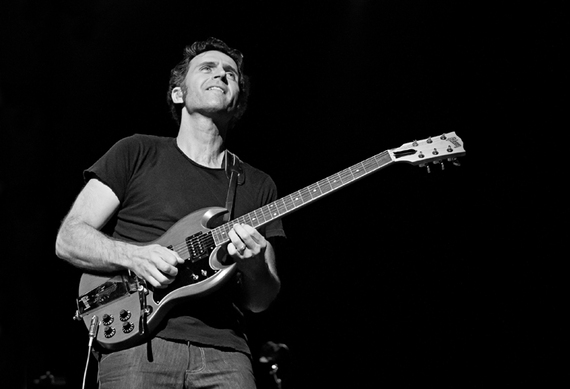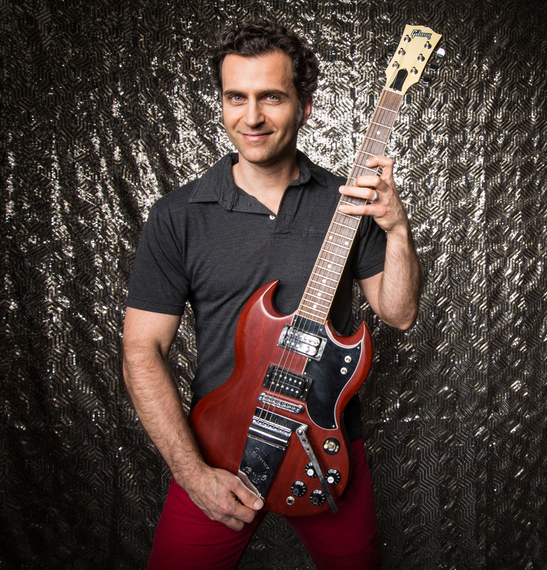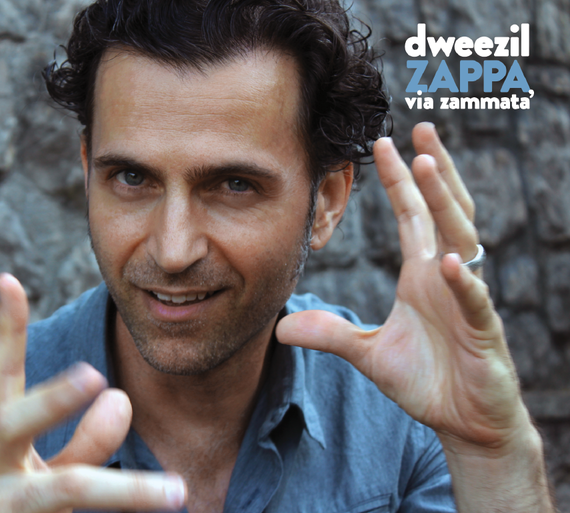"If you're motivated to make music for the sake of music, you can find some satisfaction and validation for your efforts just in that." ~Dweezil Zappa
There are a number of well-known musicians whose sons and daughters followed in their footsteps. Eddie Van Halen's son Wolfgang now plays bass with him in the band Van Halen, legendary Led Zeppelin drummer John Bonham's son Jason followed suit and has sat behind the skins playing drums in numerous bands, and the list goes on and on: Bob Dylan to Jacob Dylan, Enrique Iglesias to Julio, John Lennon to Julian and Sean, and Frank Sinatra to Nancy, just to name a few.
But when it comes to guitar, Dweezil Zappa has shown that being the bandleader on the Zappa Plays Zappa tour and through his numerous solo efforts that he could go toe to toe with his late father Frank Zappa, lick for lick, any day of the week. Recently I caught up with Dweezil to discuss many things including his newest record, touring, and inspiring others:
You recently did a successful campaign on pledgemusic.com to raise funds for your new album Via Zammata'. A lot of people in the art and music industry have been gravitating toward crowd funding platforms for various projects. How did you find that experience?
DZ: I found it to be a really good and actually inspirational way to work on a project because what you are offering to people is the opportunity to support a project from the ground up. They get to see videos, blogs, and photos of everyday occurrences in the studio and you're getting this feedback from people along the way, which you don't normally get. There were a lot of positive expressions from people throughout the whole thing and it helped me to propel the project in a lot of different directions.
This John Malkovich spoken word song on your new record is something else. How did this collaboration come to light?
DZ: That song was kind of a strange thing. I got a call from my tour booking agent that said that he got an e-mail about a possible collaboration with a John Malkovich project. There wasn't a lot of information about what it was because essentially what started off as a photo exhibit, turned out to have an audio accompaniment to it. He did something where he recited Plato's Allegory of the Cave and gave it to about twelve different artists and asked them to make some music to go with it. So the record that he will have is his same performance, but the music will change depending on the artist who did the music. The song that I did appears on my record and his record, but with different titles. The funny thing is, I have yet to even meet John Malkovich.
And speaking of collaborations, the song Dragon Master was a team effort between you and Frank (Zappa). I'm surprised that a collaborative effort didn't happen sooner.
DZ: Well, we never really talked about writing anything together. But my dad handed me those lyrics in 1988 and said, you should write some music to this. He was just goofing on the world of heavy metal. At the time, metal music really became quite a joke of itself. It was still a very popular form of music on the charts, but it turned into "hair metal" and other things. Anyways, he wrote these lyrics that were meant to lampoon the world of heavy metal, but what I decided to do on my record was to take the joke a little further but make the delivery of the music dead serious. If you're a metal fan, there's no joke. This is a bona fide heavy metal masterpiece. But, anyone that's not into metal will hear the silliness behind the lyrics.
When you have so many different ideas and sounds represented on a record, how does anyone figure out who the real Dweezil is?
DZ: I think that is something that is always a challenge. If you listen to my records over the years, they all change quite a bit from record to record. I think it really comes down to the fact that I haven't had a lot of time to spend on my own music in the past decade because I have been playing my dad's music. But through this, I've learned a lot about things I can do musically so I wanted that to reflect on this new record. The music also parallels this trip that I made to Sicily, which is where the title of the record comes from. Via Zammata' is a street in Sicily in the town where my dad's family emigrated. That experience of going back to my roots inspired a way to make a musical journey. I tried to bring together all of the elements that made me interested in music to begin with-- songwriting styles and production and instrumentation and pull it all together in one way, which is a bit of a challenge when you are trying to make each song have a different character or flavor. It's all a lifetimes worth of things rolled into one.
 Photo courtesy Marc Lacatell. mlacphotography.com
Photo courtesy Marc Lacatell. mlacphotography.com
The first time that I ever heard of Dweezil Zappa was in the late 80's. I picked up your cassette, Havin' A Bad Day after seeing the video on MTV. I remember the Arsenio Hall show appearance and seeing the blue Jackson guitar with Madonna's face on it. You are known for playing a variety of guitars, and in fact you played a lot of different guitars on Via Zamatta', but the one that seems to be your mainstay in recent years has been the Gibson SG. What does the Gibson do for you that the other guitars don't--like the Charvel's and Jackson's of the past?
DZ: I never really locked into any single guitar in the past because each guitar would make me play a different way and make me think about writing in a different way. When it came to playing difficult parts in my dad's music, the SG is the most comfortable guitar to play for that. There is something about the scale length and the balance of the guitar that makes it easier to execute some of these hard parts, more so than a (Fender) strat shaped guitar.
You've spent a lot of time in recent years covering your father's music on the Zappa Plays Zappa tour. Do you remember the initial response you got from family, friends, and people in the industry when you said that you wanted to tackle all of Frank's tunes? Was it a positive response from the very beginning or were there mixed emotions from people?
DZ: The challenge in the beginning, as far as promoters were concerned, was they only wanted to do it as a parade of alumni. This was the exact opposite of what my interest was, and the main reason for that was, for his music to be picked up by a younger generation, they would need to be able to see younger musicians without any affiliation playing the music. In the same way an orchestra is playing the music of Beethoven and Mozart, that music is carried forward by what appears on the page by different musicians with no affiliations. My idea toward this was to present it in that way because that was going to be the key to having it be accepted by a younger generation. You got to look at it this way; my father's core fans right now, at the earliest, are in their late 50's and 60's, and at the latest are in their 70's and early 80's. The older ones are not necessarily the ones coming to concerts--these aren't the people who will be carrying the music forward. My goal was to get the people in there 20's, 30's and 40's interested in his music, but they won't get the message if you're on stage with people in there 50's, 60's and 70's. The first year that we did the Zappa Plays Zappa tour, we had some alumni join us, but I had a younger core band.
What would you say is the most important lesson Frank taught you about music?
DZ: If you like what you're doing, than that's good. He didn't care about what other people thought. He made music that he liked, and if other people liked it--bonus. If you're motivated to make music for the sake of music, you can find some satisfaction and validation for your efforts just in that. If you are looking at this from just a business standpoint, and saying, hey, I want to make money from doing this and be famous, prepare yourself for a lot of disappointment.
 Photo courtesy TrueFire.com
Photo courtesy TrueFire.com
One thing that you do to connect personally with your fans is that you give guitar lessons while you're out on tour. 1.) Do you think that more musicians should do this? and 2.) Do you feel that music education has taken a backseat in our school systems in the US?
DZ: To answer the second part of your question, I think that there is no music appreciation or history being taught in schools. It leaves kids today at a big disadvantage. If they are only exposed to what the current music is, they have no idea about the decades before when stuff was really being invented--when it was the authentic version of the watered down things that they are getting today. As for people doing more teaching, it all depends on the people. I like to do it because as a kid, I was really curious to learn music. There wasn't anything like the Internet where you could just click a button and see everything. I had to figure it all out by listening to records. I think guitar players all have a similar goal in mind when they are first getting started. I have some tools that are helpful for that process.
Have you ever had a well-known guitar player give you a guitar lesson?
DZ: I have taken tons of lessons from different people, even in the past five years. Whenever I find a guitar player who is doing some things that I want to know more about, I reach out to them. I've also had some full-circle kind of experiences. When I was twelve, Eddie Van Halen came over to our house and he showed me some things. Years later, I sat down with him to show him some things that I learned from doing the Zappa Plays Zappa stuff, and he was like, oh man that's pretty crazy, can you show me that again. So it was kind of crazy this full-circle thing and now I'm showing him stuff.
What has been the most memorable guitar-related moment or story in your life?
DZ: There have been a lot of things--Playing with my dad for the first time at the Hammersmith Odeon when I was twelve--that was pretty cool. I had no idea about playing live and I had only been playing guitar at that point for nine months, and I could only play in the key of A. My dad would give the band a hand signal because the song they were playing was in the key of B. They would modulate down to A for the solo, and then when I was done playing, the band would go back up to the original key--to me that was like a magic trick. Also, seeing Eddie Van Halen for the first time, seeing him at our house, watching him play the intro to Mean Street, these things would be forever burned into my mind.
Dweezil Zappa's newest release Via Zammata' will be available digitally and in stores on November 27, 2015.
For upcoming tour dates and all things Dweezil, visit dweezilzappaworld.com

